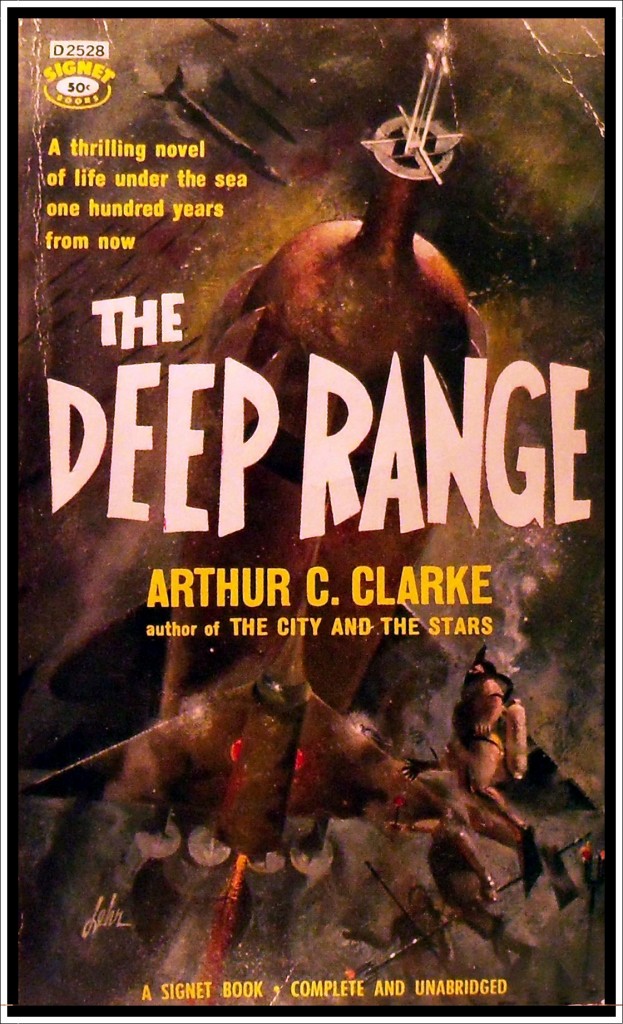By Scott A. Cupp
This is the 175th in my series of Forgotten Books.
Over the last 50 years I have read a lot of science fiction and, early on, I tried to concentrate on some of the classics of the field. I got hold of a list of the greatest science fiction as determined by the readers of Astounding/Analog in 1957 and 1967 (if I remember correctly). This list included such things as A Canticle for Leibowitz, Last and First Men, Childhood’s End, The Demolished Man and many more. (I made a very quick look online and did not see it. That’s not to say that it isn’t out there, but my patience was small).
I found that I really did not like the works of Arthur C. Clarke. And I did give him a try. I read The City and the Stars, Childhood’s End, The Other Side of the Sky, A Fall of Moondust, Against the Fall of Night, 2001: A Space Odyssey and more. I enjoyed Childhood’s End and A Fall of Moondust. But I just didn’t love them the way I loved a lot of other books by other writers. His award winners Rendezvous with Rama and The Fountains of Paradise never appealed to me. I find his characters wooden and his plots pretty contrived.
I know many of you love these books, and maybe someday they will leap into my hands and I might come to love them, but that has not happened yet. And that is one of the things I love about the field. I can see what some people love in books and while they may not appeal to me, we are still part of the same geeky family.
That said, why did I pick up this Clarke book this week? Beats me. But I really enjoyed A Fall of Moondust and the subject of The Deep Range was something I had interest in. I have had a copy for a while, and since I’ve been addressing some classic writers recently, I thought this might be the time. And I’m glad I did.
The Deep Range is set some discrete period in the future when the population and overcrowding have outstripped the ability of land farms to supply the food and nutrition necessary for life. The single world government has established the World Health Organization’s Bureau of Whales. Whales are a major portion of this world’s food supply. Plankton farming provides protein for humans and whales. The Bureau of Whales’ wardens provide protection for this resource – protecting them from the orca killer whales and keeping them safe and sheltered during calving time.
Walter Franklin is a former spacer who has been grounded and is now on an escalated training course to become a whale warden. His six-month training is accelerated from the normal multi-year training. Walter is trained by First Warden Don Burley who is given no background on Walter’s situation. He is reluctant at first but soon finds himself growing to like the man. They both find themselves attracted to scientist Indra Langenburg, who is working up a master’s thesis on sharks, but it is Walter that eventually wins her.
The novel covers around 20 years of Walter’s time with the Bureau and his adventures, which include a near death experience in very deep water, encounters with a giant squid and a giant sea serpent, bureaucracy, activists and a rescue of a fallen submarine.
Walter Franklin is a likable character and I really enjoyed reading his adventures. Clarke was a diving enthusiast and spent a great deal of time underwater, exploring the ocean floor and fauna. You get a lot of that information in various info dumps as Walter learns about his environment, but I like the subject and actually enjoyed those bits.
So, I give this one a thumbs up. It may not be in most people’s list Clarke’s best, but it’s on mine. And, as I repeatedly say, my taste is in my mouth and your mileage may vary. If you like Clarke, the seas, whales or adventure stories, you could do much worse than The Deep Range.
Series organizer Patti Abbott hosts more Friday Forgotten Book reviews at her own blog, and posts a complete list of participating blogs.

